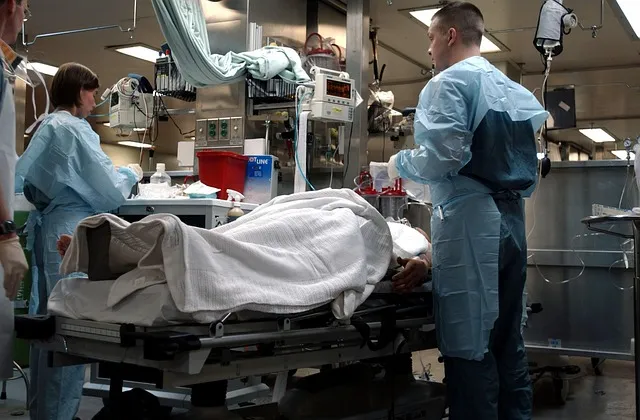In today's competitive healthcare landscape, continuous patient care beyond regular clinic hours is vital. Implementing robust after-hours patient support through dedicated call centers ensures prompt responses, enhancing clinic accessibility and patient satisfaction. This service bridges the gap between visits, allowing medical professionals to maintain high care standards even outside business hours. By training staff in medical procedures and communication protocols, these systems provide immediate assistance, improve efficiency, and foster trust between patients and providers. Advanced technology enables seamless triage of emergencies while handling routine queries, ultimately revolutionizing healthcare delivery. KPI metrics help measure success and identify areas for improvement.
In today’s fast-paced healthcare landscape, providing exceptional patient care extends beyond typical working hours. Round-the-clock patient call support is no longer a luxury but an essential tool for clinics and doctors’ offices aiming to maintain high service standards. This comprehensive guide explores the critical need for after-hours assistance, its numerous benefits, implementation strategies, training considerations, technological solutions, and key performance indicators to ensure effective patient engagement and satisfaction.
- Understanding the Need for After-Hours Support
- Benefits of Round-the-Clock Patient Call Handling
- Implementing an Effective After-Hours Support System
- Training and Preparedness for Out-of-Hour Scenarios
- Utilizing Technology for Seamless After-Hours Care
- Measuring Success: Key Performance Indicators
Understanding the Need for After-Hours Support

In today’s fast-paced medical landscape, providing continuous patient care is non-negotiable. Many patients prefer to reach out outside regular clinic hours for various reasons—whether it’s an urgent concern or a simple query. Ignoring after-hours calls can lead to missed opportunities for diagnosis, treatment, and patient satisfaction. Moreover, in emergencies, prompt answering support can make a significant difference in patient outcomes.
An always-available call center offering emergency answering services ensures that every call is addressed promptly, enhancing the clinic’s accessibility and reputation. This service bridges the gap between clinic hours, fostering a sense of security among patients. With dedicated staff trained to handle diverse medical inquiries, after-hours support becomes an invaluable asset for clinics, allowing them to maintain high standards of care even outside business hours.
Benefits of Round-the-Clock Patient Call Handling

In today’s fast-paced medical landscape, providing seamless care extends beyond typical working hours. Round-the-clock patient call support is a game-changer for clinics and doctors’ offices, ensuring that every patient interaction is valued and addressed promptly. This service offers numerous advantages, especially in managing after-hours patient support. When patients require assistance or have urgent queries outside regular office hours, an on-call team equipped with specialized training can provide immediate assistance. This not only improves patient satisfaction but also reduces the risk of critical issues going unnoticed.
By implementing an efficient after-hours answering clinic, medical practices can effectively handle late-night patient calls and weekend emergencies. It allows doctors to focus on complex cases during regular hours while delegating routine inquiries and basic patient support to a dedicated team. This approach enables healthcare providers to stay connected with their patients 24/7, fostering trust and ensuring no opportunity is missed in delivering comprehensive care.
Implementing an Effective After-Hours Support System

Implementing a robust after-hours patient support system is pivotal for clinics and doctors’ offices aiming to provide exceptional care. This involves strategically planning for periods when regular staff are unavailable, ensuring every call and patient query receives timely attention. A reliable solution is to employ dedicated after-hours call centers or remote agents equipped with comprehensive medical training, allowing them to handle a range of non-urgent patient needs, from answering routine questions to scheduling appointments.
Integrating such a system enhances patient satisfaction by offering continuous support, fosters trust, and improves clinic efficiency. Weekend call answering, late-night patient calls, and emergency answering support are key components that collectively contribute to an efficient after-hours care framework. By prioritizing patient communication during off-peak hours, healthcare providers can ensure no opportunity is missed, ultimately leading to better-managed practices and improved patient outcomes.
Training and Preparedness for Out-of-Hour Scenarios

Effective after-hours patient support requires rigorous training and preparedness to ensure smooth operations when clinics and doctors’ offices are closed. Staff assigned to handle out-of-hour calls should be equipped with comprehensive knowledge of medical procedures, patient records systems, and communication protocols. This includes understanding emergency triage procedures and knowing when to escalate issues to on-call physicians or specialists. Regular simulations and training sessions can help them stay alert and confident in their abilities.
An always available call center for after-hours patient support acts as a vital safety net. Equipped with emergency answering support, this dedicated team can promptly assess incoming calls, provide basic medical advice, and arrange for necessary referrals or emergency services. Such proactive measures not only ensure that no patient call goes unanswered but also contribute to the overall efficiency and reputation of the clinic, making it an after-hours answering clinic par excellence.
Utilizing Technology for Seamless After-Hours Care

In today’s fast-paced medical landscape, providing seamless after-hours patient support is paramount for clinics and doctors’ offices to maintain excellent care standards. Technology plays a pivotal role in ensuring that no call goes unanswered and critical information isn’t missed during non-business hours. Advanced call center solutions, including automated answering systems and 24/7 live agents, serve as the backbone of effective after-hours patient support. These systems can efficiently manage incoming calls, triaging emergencies promptly while providing routine inquiries with prompt responses.
An always available call center equipped with emergency answering support ensures that patients receive immediate assistance during weekends or off-peak hours. This level of availability improves patient satisfaction and can significantly reduce wait times for critical matters. By implementing robust technology, medical practices can guarantee that their patients are never left without the necessary care or guidance, fostering a sense of security and trust in their services.
Measuring Success: Key Performance Indicators

Measuring success in after-hours patient support is paramount to ensure the service provided aligns with the needs and expectations of clinics and their patients. Key Performance Indicators (KPIs) play a pivotal role in gauging the effectiveness of such programs. One critical KPI is after-hours patient satisfaction, which can be assessed through surveys or feedback forms, capturing patient experiences when they reach out during non-business hours.
An always available call center aiming to excel should strive for high first-call resolution rates, minimizing the need for patients to repeat their inquiries. Additionally, tracking late night patient calls and ensuring prompt responses can demonstrate the service’s reliability and commitment to patient care. These KPIs collectively contribute to a comprehensive evaluation of the after-hours support program, highlighting its strengths and areas for improvement.
